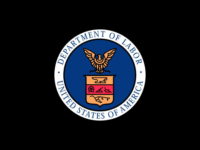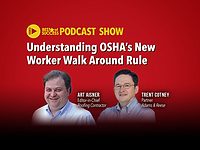Labor and the Law
U.S. Chamber Asks Court to Enjoin OSHA ‘Walkaround Rule’
The U.S. Chamber of Commerce and other national trade groups seek injunctive relief against rule allowing third parties to ‘assist’ inspectors

The U.S. Chamber of Commerce and a coalition of business groups filed a lawsuit on Tuesday against the Occupational Safety and Health Administration seeking an injunction against the new ‘Walkaround Rule" that went into effect in March.
The lawsuit, filed on May 21 in the Western District of Texas, challenges OSHA’s expansion of third-party access to employer worksites during inspections. The complaint asserts that the rule gives union organizers, activists, plaintiffs’ attorneys, and even competitors access to workplaces under the guise of “assisting” OSHA inspectors during routine inspections.
“OSHA upended over 50 years of precedent by dramatically expanding the type of third parties allowed to accompany inspectors during walkarounds,” a statement released on the Chamber’s website stated. “The OSH Act permits employee representatives to accompany the inspectors, which was generally limited to employees themselves, with very limited exceptions.”
Plaintiffs assert that the presence of these third parties can “expose companies to excessive lawsuits and unionization efforts, cause disturbances, reveal confidential business information,” and raise safety concerns.
“OSHA’s new walkaround rule is the Administration’s latest regulation to take a 'whole-of-government' approach to promoting unionization at all costs,” Marc Freedman, vice president of the U.S. Chamber of Commerce’s Employment Policy Division, said in a statement.
“OSHA claims this rule is about workplace safety, but as some union organizers have publicly admitted, this rule is about gaining access to nonunionized workplaces to advance their organizing campaigns," he added.
The Chamber is joined by co-plaintiffs, including the Greater Waco Chamber of Commerce, Longview Chamber of Commerce, Associated Builders and Contractors, Alliance for Chemical Distribution, Associated General Contractors, International Franchise Association, International Warehouse Logistics Association, National Association of Manufacturers, National Association of Wholesaler-Distributors, National Federation of Independent Business, and National Retail Federation.
The complaint argues that the regulation exceeds OSHA's statutory authority, violates the Fifth Amendment's “Takings Clause,” and was promulgated in violation of the Administrative Procedure Act and the Regulatory Flexibility Act. The plaintiffs are seeking declaratory and injunctive relief to declare the regulation unlawful and prevent OSHA from enforcing it.
What is the Purpose of the Walkaround Rule?
The purpose of the Walkaround Rule, as stated in the document, is to expand the rights of third parties to access employer worksites during OSHA inspections. The rule allows authorized employee representatives and non-employee third-party representatives to accompany OSHA inspectors during inspections.
OSHA defines an "authorized employee representative" as a representative designated by an employer's employees. This designation typically occurs in unionized workplaces where a majority of employees have chosen a labor union as their representative for collective bargaining purposes.
The authorized employee representative acts on behalf of the employees in matters related to health and safety in the workplace. However, under the Walkaround Rule, OSHA expanded the definition to include employee representatives and third-party representatives designated by employees, such as union organizers or community activists.
The lawsuit asserts the rule is intended to politicize health and safety inspections, granting union organizers access to non-union workplaces and providing opportunities for litigation against employers.
Duane Musser, the National Roofing Contractors Association's vice president for government relations, said the NRCA opposed the Walkaround Rule and filed comments to that effect with the Construction Industry Safety Coalition.
"The NRCA and [some] other construction groups have so far decided not to pursue litigation, but we are pleased to see that the Chamber and other groups are doing so," Musser wrote in an email, adding that the NRCA also supports a resolution in the House introduced last week — House Joint Resolution 147 — which would nullify the regulation if enacted into law.
The full complaint can be viewed here.
Looking for a reprint of this article?
From high-res PDFs to custom plaques, order your copy today!







